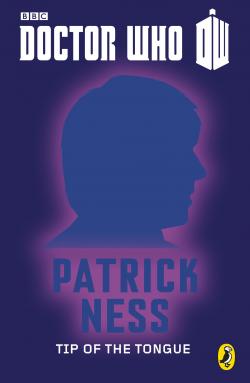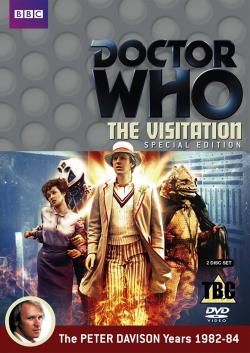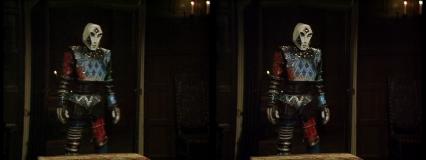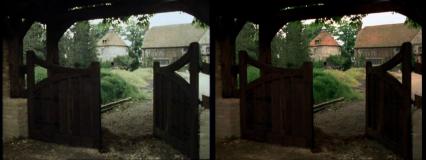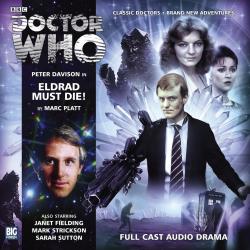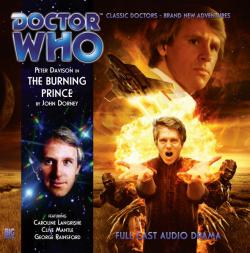This review is based on the UK Region 2 DVD release.The Visitation falls just a couple of stories before the return of the Cybermen turned me into a fully-fledged fan (as opposed to a regular watcher), but it was certainly a strong enough tale to keep my attention from its opening moments in a cosy Manor House to the destruction of central London at its denouement. Coupled with a striking monster, android, and the flamboyant Richard Mace, it remains one of my favourite stories from that era!
"Well they've certainly let the grass grow since I was last there!":
It's time to take Tegan home, but with the reliability of the TARDIS being what it is, they arrive some 300+ years too early much to the air hostess's irritation. Once everybody's calmed down, a little exploration is called for, but unsurprisingly leads them into trouble with locals, and it is only their meeting with thespian turned highwayman Richard Mace that gets them out of the tricky situation. Mace explains about plague fears, but then the description of a comet seen some months previously and also of alien artefacts found in a barn engages the Doctor's interest ... and as curiousity draws in the cat, the time travellers become embroiled with the desperate attempts by a group of escaped Terileptil prisoners to seize control of the planet through genocide via their own enhanced plague ...
Though fourth broadcast,
The Visitation was
Peter Davison's second story to be produced. At the time it was reported that the recording order was to enable the new Doctor to settle into his role, but as the production notes point out it was a rather more mundane reason in that the opening story simply wasn't ready! As a result, watching the credits can be a confusing affair with who is responsible for what, with this story seeing the actual first contribution to the series by
Eric Saward as a writer before assuming the shackles of script editor even though he's credited as such earlier in the season - I tend to feel that this story is actually one of his greatest triumphs, perhaps because he had yet to be encumbered with overall responsibility for scripts. Here we get a simple, progressive tale that takes us from the initial encounters above through to the eventual besting of the Terileptils and the accidental start of a Great Fire ...
In later years there was to be a lot of criticism over the apparent rampant continuity (and associated errors) within the JNT era, and the first 'biggie' rears its head with the above Fire - though as this clash is with a throwaway line from the Doctor at the tail end of
Pyramids of Mars I think it is forgiveable at this stage! However, producer
John Nathan-Turner was already attempting to establish a sense of narrative continuity in the series in a way vaguely reminiscent of the early adventures of the First Doctor, though it did have a tendency to feel shoe-horned in rather than natural (something Saward complained about for this story, though he was just as guilty later on!). So here we have the Doctor remonstrating Adric over the TSS machine, and Tegan trying to explain her violation by the Mara in their previous adventure on Deva Loka - though with the out-of-sequence filming of Davison's early stories,
Kinda was filmed
afterwards (and leading to
Janet Fielding pronouncing Mara differently here!). Later, we have the Doctor exclaiming
"Not again!" when he's about to have his head chopped off at the end of episode two, a reference to it almost happening to him in
Four To Doomsday (though this was added by Davison himself!).
The story introduces the aforementioned Terileptils, and though we only meet a nefarious section of their society they come across as an interesting race, and its a shame they never returned to the show (except via a reference in
The Awakening. Also making an appearance is one of their androids, which is a great design (highlighting the Terileptils' eye for beauty), but was revealed way too early in the story in my view. I've always enjoyed plots that seem to start off in one direction and then suddenly take off in another, unexpected one - here, I felt that the story would have been better served had the android not been seen breaking into the Manor at the start and thus revealing the sci-fi origins so quickly (this still annoys me about the film
Predator with the spaceship at the start - without that introduction the film would have so much more surprising as the true enemy was revealed). Still, with
Doctor Who being well-established as a science-fiction show it isn't so surprising that this element plays its hand so early on - doesn't mean I have to like it though!
Of the main cast members,
Michael Robbins brings the flamboyant Richard Mace wonderfully to life, and in a parallel series could have made a fine foil for the Doctor in his travels in much the same way as Jamie complimented the Second Doctor. Mind you, we'd have had to thin out the TARDIS crew quite a bit, though Saward did a reasonable job in giving all of the principals something to do and something to say during
The Visitation.
Michael Melia does a fair job in bringing the Terileptil leader to life considering being stuck underneath the prosthetics - though
Peter van Dissell had even more of a job in the android suit! The rest of the cast is okay, though they didn't really get that much to do, and the accents seem to meander a bit, especially considering the story was set in 17th Century Heathrow!
Other observations:
- The almost throwaway opening with the family passing time together is quite poignant, and it's shame we lose them after just that single scene.
- Tegan gets some of the best lines during the early scenes, with her comments over the Doctor's "incomprehensible answers", and how "a broken clock keeps better time than you do!"
- There are good cliffhangers and bad cliffhangers, and then there are some that almost seem to be just 'cut here' - episode one certainly feels like that!
- when Adric asks what nectar tastes like, Mace sounds like he's about to turn into Corporal Jones, cut off just as he was going to say "you stupid boy!".
- It seems quite strange for Nyssa to operate the machine in her bedroom - but then in theory the console room exists in a state of temporal grace and so perhaps it needed to be away from there ... though Earthshock indicated it wasn't working any more - did Nyssa bugger it up, here?!!!
- Another TARDIS feature to have been 'lost in the continuity 'fog' is the isomorphic control of the TARDIS as mentioned in Pyramids - all of the Doctor's newest companions have had a bash at it by this point - maybe this can be blamed on K9 after The Invasion of Time?
Overall, I found the story to be a straightforward, enjoyable tale, and one of the better stories from the Fifth Doctor's era. It was also quite a memorable story for me back when it was first broadcast, though it wasn't the realisation of the Terileptils or the android so much as the demise of the sonic screwdriver. As with the departure of K9 a year earlier, I can fully understand now the reasoning of removing it from the plot resolution portfolio (and that is ably demonstrated by its over-reliance in the modern series), but at the time I was just as sad to see the departure of "an old friend" as the Doctor was!
The DVD:
As a Special Edition, it's the improvement to the sound and picture quality that would attract those who have bought the DVD release, and again it doesn't disappoint in that regard. It's the film sequences that really shine through, as the Restoration Team went back to the original 16mm film negatives and re-scanned the sequences, though the studio sequences also seem much crisper this time around too, as evidenced in these comparisons from the beginning of episode one:
With regard to the film sequences, there had been some controversy over apparent loss of "sharpness", such as the brickwork in the above shot;
Steve Roberts noted, however, that:
"it looks like the neg is naturally sharp and the older print has had a bit of artificial sharpening added into it, that's all. Also, the presence of grain makes pictures appear to be sharper than they actually are, and the old sequences are definitely grainier!". Personally, I think its only with freeze-frames that the rendering might throw up such a discrepancy, it certainly isn't apparent when watching the action unfold normally!
As with other special editions, the production notes have been completely revised and brought up to date, with
Nicholas Pegg guiding us through the production of the story. All the usual intricate details are present, such as the changes from script to screen, character notes, casting, etc., so if you want to know about the historical accuracies within the plot, or what magazine Nyssa happens to be reading in the TARDIS, here's the place to go!
The rest of Disc One contains the features that were included with the original release. In brief, there's the
Film Trims, which show some of the retakes and cut bits from the story (and being the original unrestored footage acts as a good comparison against the sterling work on the episodes themselves).
Directing Who sees director
Peter Moffatt discuss his six engagements on the series from
Full Circle through to
The Two Doctors.
Writing a Final Visitation features
Eric Saward chatting about how he went about creating his television debut.
Scoring The Visitation delves into the incidental music of
The Visitation by
Paddy Kingsland (for me, the best composer of this era of the show). Also included are the isolated music track and original highly amusing commentary by
Peter Davison,
Janet Fielding,
Matthew Waterhouse,
Sarah Sutton, with Peter Moffatt, plus the ubiquitous Photo Gallery.
Disc Two contains the new features of this release, with pride of place going to
Grim Tales, the behind-the-scenes documentary for
The Visitation. This takes the innovative approach of taking Peter, Janet and Sarah back to the locations of the story to reflect on the production of the show - Matthew was unavailable for the shoot, unfortunately, but as with the commentary those present made sure his "memorable moments" were remembered! The trio are instead joined by the anachronous
Mark Strickson, who acts as steward as they try to navigate their way around the rather large Black Park - though fortunately also having
a rather handy guide from yours truly (grin).
After the forest antics the group then travel by handy TARDIS to the location of the manor house (Tithe Barn), whose current owners discovered they had inherited the
Doctor Who legacy when they purchased the property thanks to a copy of
The Visitation being left behind. Along with the anecdotes of filming was a rather nice "Visitation Cake" which almost seemed a shame to eat ... not that it stopped them!
The relaxed, informal recollections were interspersed with illustrative clips, plus some more traditional interviews with production team members
Eric Saward (writer),
Ken Starkey (designer) and
Carolyn Perry (make-up), talking about the more technical aspects of making the show. Plus.
Michael Melia (the Terileptil leader) added his own anecdotes of being under layers of prosthetics!
All-in-all, this was a very enjoyable approach to the making of the show, ably abetted by the utilisation of the locations which played quite a substantial role in the story. Producer
Russell Minton did a superb job in the presentation, and this this easy-going way of presentation is carried on into the producer's next feature on this disc,
The Television Centre of the Universe. Here, Peter, Janet and Mark (no Sarah this time) reminisce over what made up a typical day filming
Doctor Who at the 'heart' of the BBC as-was, 'supervised' by
Blue Peter presenter
Yvette Fielding.
The trio continue to regale with their anecdotes over their time recording the series, which for this feature loosely relate to the area of the BBC they have reached. So, at the car park there are tales of the excitement of watching
Ronnie Corbett's attempts to park, how hit-and-miss it could be to actually get into TVC's car park in the first place, and how Mark shamelessly used
Blue Peter as his excuse to get his dog Bramble in with him! Then, into Main Reception and the symbolic "handing of the key to the dressing room", followed by actually attempting to find it in the 'maze' of TVC and of course confronting the condition of the room once in! As with
Grim Tales, there are anecdotes from others inserted along the way, with people such as AFM
Sue Heddon talking about the dressing room 'dungeons' where there could be 30 artistes getting ready!
Next up is make-up, a place to hang-out it seems to get all the latest gossip. The quartet are joined by Carolyn Perry and discussed the happy atmosphere that existed back then - and how some of the senior make-up supervisors were to be avoided where possible! Inserts included fellow make-up artist
Joan Stribling talking about the 'uniforms' they had to wear, and costume designer
Odile Dicks-Mireaux on how Peter could be naughty with the polaroid camera. Other contributors included production assistant
Jane Ashford on the TVC 'industry' and former DWM editor
Richard Marson chatting about how you couldn't miss DW when 'in town'; plus, special mention to film traffic supervisor
Neville Withers and his Jon Pertwee anecdote.
This was a wonderful feature, and continues the warm feeling about TVC that we've had of late with the 'last night' programming back in March and Marson's wonderful
Tales of Television Centre last year. This is very much how I hope TVC will be remembered, and not marred by some of the recent incidents that have come to light and the press gleefully seized upon. Roll on, part two!
Also included on the disc is the next instalment of
Doctor Who Forever!,
The Apocalypse Element, explores
Doctor Who's thriving adventures on audio. Kicking off with the vinyl releases of the original series,
Nicholas Briggs unsurprisingly champions
Genesis of the Daleks whilst
Gary Rusell and
Steve Cole discuss their fond memories of original adventure
The Pescatons. There's also an honourable mention of that quintessential disco favourite,
Doctor Who Sound Effects (injoke for convention-goers of many years ago!) - though from a completist point of view, where's the mention of the original TV Century 21
David Graham narrated release of the end of
The Chase!
Of course, the primary focus of the documentary is on how
Big Finish has gone from strength to strength over its humble beginnings in 1998 with adaptions of adventures starring
Lisa Bowerman as
Bernice Summerfield, the arrival of
Doctor Who proper the following year with
Colin Baker,
Sylvester McCoy and
Peter Davison, then
Paul McGann in 2001, and their successes with
Dalek Empire,
The Lost Stories and finally the arrival of the fourth Doctor himself,
Tom Baker in 2012. As usual, a variety of contributors chat about the range, including future series writers like
Paul Cornell,
Mark Gatiss,
Joseph Lidster, and
Rob Shearman. plus the producers
Gary Russell,
David Richardson and not least the overall 'guardian'
Jason Haigh-Ellery. Plus
Russell T Davies chats about how the range kept the flame alight in the 'wilderness years' and how he then reciprocated in keeping that BF flame going in the turmoil of the series returning to television.
On the
AudioGo side of the fence,
Michael Stevens commented on how the narrated soundtracks and then the narrated Target novelisation have also proved popular, and on how they tempted Tom Baker back to
Doctor Who with
Hornets' Nest.
Overall, the feature is a little more serious than the previous instalments, but still very interesting to watch and a good overview of how the
Doctor Who world is enhanced outside of the television series itself.
The disc is rounded off with the PDF files for Radio Times listings and the BBC Enterprises Sales Sheet, plus the Coming Soon which unlike with
The Aztecs does introduces the next scheduled release!
Just to round of, I don't usually think about the menus themselves, but one thing I noticed about the clips used was that they seemed to be focussed on some of Matthew Waterhouse's lesser moments in the story ... pure coincidence I'm sure!
Conclusion:
This is a fun story, as much of Season Nineteen turned out to be, and for those who aren't familiar with the Davison era is one of the stories that I'd recommend to get stuck in with, as there is little continuity baggage to worry about as the following years started to suffer from. For those who purchased it before, I'd certainly recommend the documentary as a great additional feature, and the enhanced clarity of the film sequences give the story a new lease of life.
Coming Soon...
The Doctor's attempts to regain his mastery over time and space go awry as he instead travels into a parallel universe, where friends become enemies in a world counting down to disaster in
Inferno Special Edition
